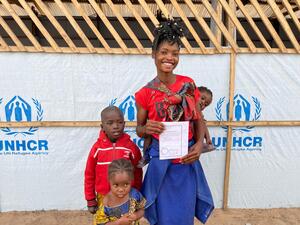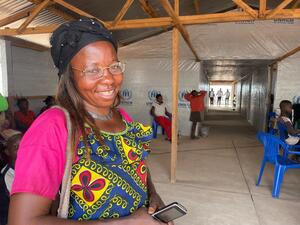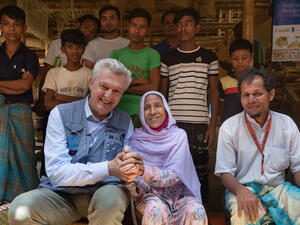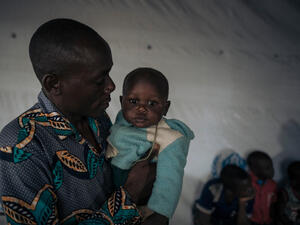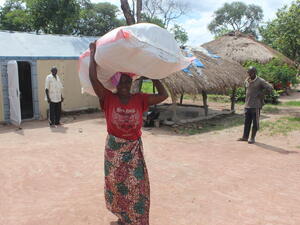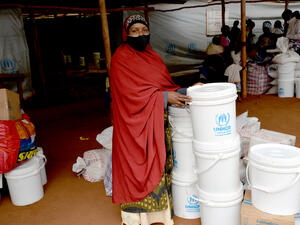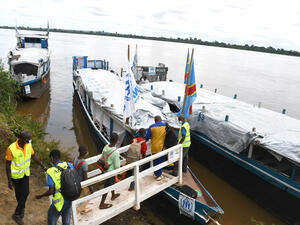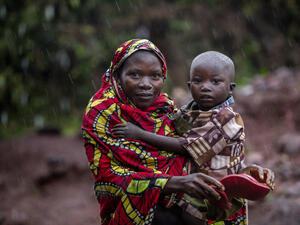Survey finds Nigerian refugees in Cameroon want to go home
Survey finds Nigerian refugees in Cameroon want to go home

Refugee children repair a bicycle at Minawao camp in Cameroon, 2015 file photo.
YAOUNDÉ, Cameroon, May 13 (UNHCR) - More than three quarters (76 per cent) of the tens of thousands of Nigerian refugees in northern Cameroon want to return home amid an improving security situation in areas of north-east Nigeria, according to a survey by UNHCR, the UN Refugee Agency.
But the survey, conducted earlier this month in Cameroon's Minawao camp, showed that those who want to return are still concerned about conditions in their towns and villages of origin. And while 45 per cent of them wish to return home immediately, 38 per cent want to wait and see how the security situation evolves.
UNHCR shares these concerns and stresses that all returns should be voluntary and that people should not be sent back to areas of insecurity and widespread destruction where their lives would be more difficult and fraught with dangers. At the same time UNHCR urges governments to keep their doors open to people fleeing conflict.
UNHCR staff interviewed 7,939 of the 56,783 refugees in Minawao camp, or 14 per cent. (There are almost 65,000 Nigerian refugees in Cameroon). More than half were women (54 per cent), reflecting the camp demographic, and about half are 35 years or older. Some 44 per cent said they had access to information about their home areas through their phone, new arrivals, family and friends, media and the internet.
Those wishing to return cited concerns about living conditions, provision of basic services and damage to homes and infrastructure, including schools and health centres. Lucas, who arrived in Minawao in August 2014 after fleeing Gwoza in Nigeria's Borno state, said he dreams of reuniting with relatives in Nigeria.
He said most refugees shared this desire, but added: "Our villages have been totally destroyed and the security situation remains uncertain. We lost all our properties and if we have to return we will need support from our government to rebuild our lives."
He and others called for reconstruction programmes, aid packages, livelihood projects and deployment of the armed forces to ensure security. Of those not wanting to return, 59 per cent said they had no financial resources, while 8 percent said they had nothing to return to.
Nigeria's President Muhammadu Buhari and Cameroon's President Paul Biya met last week in Abuja and discussed the return of Nigerian refugees under a planned tripartite agreement with UNHCR. They agreed that this should be convened by July and aim to forge a framework for the safe return of refugees.
Returns from Cameroon have been a sensitive issue in the past, with UNHCR unable to gain access to more than 20,000 people sent back to Nigeria since 2015 from the militarized Lake Chad area to ensure they were returning willingly.
UNHCR says returns must be voluntary and both governments should take the concerns of refugees and internally displaced people seriously. UNHCR remains ready to work closely with the two countries to guarantee the rights of refugees to voluntary return in safety and dignity and to speed up reintegration projects.
Over the past year, the governments of Nigeria and Cameroon have pushed back Boko Haram insurgents in north-east Nigeria and northern Cameroon, bringing greater security in some areas. But the insurgency remains a major threat to peace in the region.
The conflict has forced more than 200,000 people to flee to Cameroon, Chad and Niger following attacks on their villages in Nigeria's Borno, Adamawa and Yobe states. The conflict has since 2014 spilled over into Cameroon, where some 170,000 Cameroonians are internally displaced in the north.

